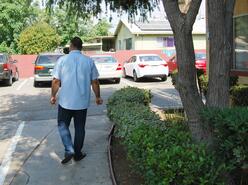
Five years ago Noor* lead a fairly stable life. He was a restaurant manager, sold cars, and worked other jobs to support his family. His wife, who has her certification to teach English but never entered the field, cared for their children. They had an apartment in Hama, Syria.
Then, in July 2011 violence in Hama escalated to a new level and they were forced to leave their home when it became unsafe both within and outside their apartment complex. Noor says it was not uncommon to see dead bodies in the street. For nearly three years the family was displaced, moving from one relative’s home to another in an attempt to avoid the unrest that surrounded them.
Forced to flee
Finally, after so long without basic public services or safety, Noor and his wife decided that it would be best to leave their home for good to provide their children with a safer community. In February 2014, they escaped Hama by car, passed through the Syrian capital of Damascus, and continued on to Beirut, Lebanon. They were nervous and worried throughout their journey, especially during checkpoints, but were able to reach Lebanon safely by claiming they were making the trip to seek medical treatment.
Upon arrival in Beirut, they boarded a plane to Amman, Jordan. Noor says that during this time, travel between Jordan and Syria was still allowed without a visa, but after the influx of refugees, this means of legal entry was halted. Shortly after arrival, Noor registered himself and his family with the UNHCR so that they could access the limited public services available to registered refugees.
Life in Amman as refugees was very difficult, as they faced both social and economic issues and limited rights. Noor says the public education for their children was insufficient, medical treatment was difficult to access, and they could not legally work or obtain a driver’s license. While Amman did offer safety that was no longer possible at home in Syria, Noor and his wife still dreamed a future for their children where they would have the opportunity to thrive.
A new beginning
On June 24th 2016, nearly five years after they first left their home, Noor, his wife, and children (now aged 8, 6, and 3) were finally resettled to the U.S. They flew to Los Angeles, California and from there were taken on a charter bus to San Diego International Airport where IRC staff was waiting to welcome them to their new home. Noor says that during the trip, he and his wife were exhausted but finally, after so many years, felt relief. The future seemed bright, he explained. Now, his only concern was that his children get a good education, and that he would be able to learn English and find employment.
Incredibly, within just one month of arriving in San Diego, Noor was able to find a job with the help of the IRC as a restaurant prep cook, a mid-level job. His experience in the restaurant industry shone through in his interview, highlighting his culinary skills and passion in food preparation. He attributed his success to the support of his IRC employment specialist who helped him “from the heart” providing Noor with confidence and relief every time they spoke.
Noor is excited for this new opportunity, and to be “independent, support his family, and not depend on public assistance.” His new employer is very kind and accommodating, and his manager wants to give him all the training and resources to improve his position. Noor truly appreciates his employer’s humanity and willingness to help.
In the long term, Noor is grateful to have options, either continuing in the restaurant business or perhaps going back to selling cars. His wife is eager to continue to strengthen her English and enter the workforce after the birth of their fourth child. Both are focused on being the best parents they can be for their children, making sure they have all the opportunities to develop and improve their position in life. All they want is to “develop [them]selves, live positively, and leave a positive thumbprint in [their] new home.”
*Names have been changed to protect the family’s privacy.